- Home
- Charles L. Grant
Jackals Page 7
Jackals Read online
Page 7
The preacher closed his eyes.
Jim rubbed his face with a palm, drew the hand stiffly down his chest. “Well, damn you, Maurice, I didn’t want to tell you that way.” He threw a false punch at one of the pillars. “Damnit.”
A soft keening note slipped into the air.
“Not now, Maurice,” he said. “Please. Not now.”
“I mourn,” the deep voice answered.
“Mourn tomorrow. They’re here tonight.”
Rachel decided that in some cartoon Wonderland-like way, their madness was comforting. Had she herself been truly sane, she would have found a way to kill both these two an hour ago. And that certainly wouldn’t have done her much good, certainly wouldn’t have saved her.
Maurice strode to the edge of the veranda and looked south along the unseen road. He shaded his eyes. He stretched out his left arm as though he were a pointer. He turned on one foot and pointed at her.
“You went to his house.”
“I—”
“Don’t tell me, child. You went to his house.”
Rather than argue, she ignored him. Instead she touched Jim’s arm until he faced her. “He was talking about scavengers, wasn’t he. Like crows and things. Carrion eaters, animals like that.”
Jim nodded.
She frowned. “But what does that—”
Headlamps flared again, this time through the tunnel trees, distracting her once more. It wasn’t until the lights had broken into the open and the car had slowed that she realized something was wrong.
“Jim,” she said.
Another insect died.
He looked at the passing vehicle, shrugged, but she said it again when the car disappeared as the mansion came between them: “Jim.”
“What? It’s just—”
“The engine. I can’t hear the engine.”
Chapter Eight
Maurice didn’t have to rush to reach the double doors in a hurry. He opened one and stepped inside. Directly ahead was the rear wall of a sweeping black oak staircase that led to the second-story gallery. The wall had ten inlaid panels carved with leaves of ivy, and when he had complained at the wasted space, Jim had shown him that if he used the heel of his hand to whack the left side of the three center panels, each would open into a fair-size long closet.
He smacked the first one on the right just as his angels came around the corner.
“I think you’d better go to your rooms, pack, go home to your mommas,” he said as he reached in and flicked on a light. “I may be gone for a while.”
He smiled at them, touched their cheeks. “And be sure the front doors are locked and bolted before you go upstairs. Turn out all the lights.”
They turned and walked away.
Lord, he thought, plucking a shotgun from its rack, I am too old for this now.
A rifle from another rack, its scope still attached.
O Lord, I have done my best, You know. I am not a perfect man, but I’m as close as they’re going to get in this forsaken county, You know that. Don’t You think I deserve something better than this?
He remembered the first time he had entered this small room; it was the day after his first angel had been found on the highway. What was left of her. And the second time … oh lord, he thought, and tried to banish that image, the one that showed him that Jim had finally found Maryanne.
What was left of her.
A spurt of bile made him touch his stomach with one hand, knead it, pat it; and he swallowed, took a breath, and suggested to his shadow spread across the bare floor that this was no time to wallow in memories best left for bad dreams.
The bile surged again, and subsided.
From a high walnut cabinet against the back wall he grabbed several boxes of ammunition and stuffed them into his pockets. He considered another rifle for the woman, but he didn’t believe she was the shooting kind. A revolver then, small enough for her to handle and large enough to do the job. He loaded it for her and prayed there was enough time to show her how to use it.
And, Lord, he added as he checked the room again, take care of Charlie’s soul. He was a good man. He was too young. He didn’t deserve it.
“Damn, Maurice, we’re not going to start a war.”
He glanced over his shoulder, at Jim standing in the doorway, one hand half in a hip pocket. “If this isn’t a war, I’d much prefer to be in bed.” He tossed the rifle to his friend, followed it with the gun. “Are they coming?”
“Rachel’s looking out. I don’t think so, though.”
“Neither, my friend, did you think they’d be back.”
Jim looked everywhere but at him. “Charlie told me … he called last night, this morning, I don’t know. He was at a pay phone outside some diner, said he spotted them down around Birmingham.”
“Them?”
“The Modeens.”
“Oh mercy.”
“All of them. He said, as far as he could tell, it was pretty much all of them. “
Maurice wished he had a place to sit down.
“He tried to tell me something else, too, but he never had the chance.” Jim stared at the barrel. “He got cut off.” He looked up at Maurice. “They found him outside Chattanooga, just like … like … “
He managed a cockeyed bitter smile.
In that moment, quick enough for a blink, Maurice wondered how his friend survived when there wasn’t hunting to do.
He wondered what would happen when all the hunting was over.
“Do you know what it was, James, the information? Can you guess?”
Jim rubbed the rifle’s stock absently. “It’s been ten years,” he said at last, quietly, as if afraid the house would overhear. “He could have meant she’s there too.”
“And you waited until now to tell me?” Maurice raised a hand to point, to scold, and let it fall helplessly to his side; what’s the use, it’s too late now. “They let Charlie be found, they let the child out there go to your home. What in the name of heaven are you thinking of, James?”
Jim didn’t answer; he only stared, then walked away.
Lord, I am cursed with a fluent tongue and a big mouth. Can’t You see Your way clear to heal me of one or the other?
He looked around again, just in case he’d missed something, then slapped off the light and closed the panel door. By the time he reached the veranda, Jim was at the car, rifle loose at his side. There was no signal, just a look, and he allowed himself a deep breath and quick prayer to calm his nerves and disperse the tension.
The woman stood behind a tall evergreen shrub at the corner of the house, the revolver in one hand. When she glanced at him, no emotion at all, he nodded his approval. With the moon this bright, and no houselight in her eyes, she could see the length of the drive and a good portion of the road. He reminded himself to ask James about her later as he crossed to the man’s side.
“Left?”
Jim shook his head. “No, don’t think so.”
Rachel waved at them to hush.
The night was too quiet.
Maurice scowled briefly, tilted his head, straining, before he realized what was wrong-the insects had stopped talking, the breeze had died, and all he could hear was his own shallow breathing, steady and calm. He wasn’t afraid. The time would come, but it wasn’t now.
They heard it then: a soft whistle, long and slow and mournful.
And then, in the dark beyond the house, in the shadows of the moon, they heard the laughter.
As the woman scuttled away from the shrub toward the safety of the house, Maurice jacked a round into its chamber and hurried to the right comer, swallowed, and allowed himself to slip off the veranda into the shadows. There was a flower bed here but no flowers, the six-foot-wide strip of earth kept constantly tilled, constantly soft. He called it his moat, the house on one side and a low wall of shrubs on the other, and James had laughed when Maurice had made it, but it served him now, dampening the sound of his progress toward the front while the laughter ended
, hanging beneath the stars, neither tempting nor daring.
Yet he still wasn’t afraid.
Had the Modeens meant real business, there’d be more than just the two, and they wouldn’t have come in from the road, it was too open.
Not afraid, but sudden perspiration washed over his face, slipped down his spine.
At the front corner he pressed hard against the house and used the moon to show him the upward slope of the lawn, the trees, the circle gardens, the road. He saw the car and heard it idling softly, the low rumble of a large cat patient and hungry; he wished for something to moisten his throat-it felt as if it had been packed with raw cotton-he couldn’t swallow, and fought to keep himself from coughing to clear it.
He didn’t see them.
They were out there, he knew it; he could feel them, but he couldn’t see them.
He crouched halfway to kneeling and allowed himself a quick glance around the corner, across the length of the front porch. It was empty, all the lights extinguished, the brass cross he’d fixed into the floor the day he’d moved in shimmering faintly, darkly, barely touched by the moon.
He waited.
There was nothing else to do.
He waited.
Watching the gardens for unlikely shadows, watching the fruit trees for an extra thickness of bole, using the idling engine up there on the shoulder to keep him alert, to remind him this wasn’t a dream, they had come.
He didn’t ask himself why.
And he didn’t think twice when he saw the shadow move.
It slipped away from a pear tree halfway to the road, slipped across the silver grass sea, heading for the fence, moving smoothly, moving swiftly, in a straight line for the car.
Maurice fired.
Too far for damage, but it didn’t matter.
He fired again and grinned, all his teeth showing, at the sound that slammed back from the hill across the way.
Stepped away from the house and fired a third time when the shadow stopped and turned to face him.
Chapter Nine
After grabbing a long-butt flashlight from the car’s back seat, Jim slipped along the left side of the house, scowling when Rachel insisted on going with him, puzzling him as she appeared to know what she was doing, keeping low, keeping tight to the wall, keeping the revolver aimed at the sky. Either too much TV, or there was something here she hadn’t told him.
He figured Maurice would go straight to the corner to watch the lawn and the drive; he would do the same, and at the same time hope to catch them in case they came from the north. He doubted that, however, because it was too open, no cover unless they had learned to merge with the low-cut grass; but he had doubted before, on other occasions, and hadn’t yet been able to anticipate surprise.
At the corner he dropped to one knee, rifle ready, breathing steady.
Nothing out there.
The Caddy was on the shoulder, but there were too many damn gardens, too many damn trees, for him to know for sure which was real and which was one of them.
He could hear Rachel breathing carefully behind him through her mouth.
He didn’t look back.
He watched the still shadows, taking care not to look at anyone for too long.
What the hell were they up to? he wondered, nearly trembling in the effort to keep his anger under control; what the hell were they doing?
He shifted, keeping the flashlight in his left hand, holding the rifle in his right.
Rachel made a sound deep in her throat and pointed over his shoulder.
A shadow moved.
The shotgun blasted.
Jim broke immediately from the house’s cover and ran for the drive, dropping the flashlight as he did to use both hands on the rifle, wincing when the shotgun fired again, stopping when the shadow did, sensing Maurice leave his place as well and bracing himself for the next blast of fire.
It came.
The shadow waved and walked calmly toward the fence.
Jim ran a few steps, put the stock to his shoulder and caught the shadow, still a shadow, in the cross-hairs of his scope.
Rachel came up beside him.
He fired, and the top of a post blew apart.
The shadow laughed and vaulted the fence, ran around to the car’s far side as Jim fired twice more, the Caddy jumping slightly on its springs as the bullets slammed into the door.
The engine roared.
The shadow ducked down as if to get inside, then took a moment to look over the roof at the two men and the woman racing toward it.
Jim glanced at Rachel, saw the flashlight in her free hand, and said, “Turn it on!”
She didn’t move.
He said, “Turn the damn light on!” and fired this time without bothering to aim.
Maurice saw the light, saw the face transfixed, saw what he knew he’d see, and still he turned away.
Rachel knew she held a gun, but she couldn’t bring herself to raise it.
My God, she thought, my God. Why hadn’t she left when she had the chance? Why the hell had she stayed?
She paid no attention to the face that quickly vanished when the shadow ducked into the car; she didn’t move when Jim began a loping angled run up the drive, firing as he went, but clearly without hope of preventing the car’s escape; she didn’t move when Maurice stomped across the porch and told her she might as well save the batteries, they were gone, it was over.
She stared at the flashlight, switched it off, and dropped it.
“When you drive at night,” the preacher said, coming slowly to her side, “you catch a deer, a possum, a raccoon in your lights, sometimes a stray tom on his way to see his lady. I’ve seen them red, those eyes, once in a while green, once in a while a pale yellow, maybe gold. The first time I saw that …”
Suddenly she grabbed the flashlight from the ground and shone it in the preacher’s face. He didn’t flinch, he smiled sadly, and she aimed the beam at the grass.
She was right—his eyes didn’t reflect the way an animal’s would.
But the man on the road.
His eyes glowed.
They glowed white.
Suddenly, Jim raced past her, shouted to Maurice, “Peter!”, and tossed something at her chest. She caught it, the car keys, and heard him tell her to get the engine going, he’d be back in a minute.
She didn’t hesitate, but ran for the car, suddenly sagged against the door. She wasn’t sure she could do this. It was happening much too fast.
Maurice took the keys gently. “It’s all right,” he said. “Get in back.”
She gave him a grateful weak smile and climbed in, huddling in the corner behind the passenger seat while the preacher turned the car around. Nausea surged and died in her stomach. She breathed with her mouth open to keep the dizziness at bay. Then Jim was back. Maurice sped to the road, fishtailed as he turned south, nearly putting them into the shallow ditch on the other side.
She closed her eyes, lower lip trembling as much from fear of the men in front as the men in the car they chased through the night.
When they reached the tree tunnel, she realized her right hand was near to cramping, stared at it, and saw the gun still in her grip.
“Peter’ll put something on the road,” Jim said tightly.
Maurice nodded.
“Did you tell him to keep Jonelle home?”
The preacher nodded again.
Moonlight helped, but not that much.
Rachel could barely see beyond the reach of the headlamps, and what she could see were merely blurs of grey.
The road ahead was empty.
“Maybe they turned off,” she said, hating the sound of her very small voice.
“No.” Jim gestured vaguely. “Nothing between here and there but the interstate.”
“And an old farm,” Maurice said. “Moore’s place, the old man that moved to Phoenix.”
“Right. Yeah, right.”
They slowed for a moment when they reached Jim’s house, a
nd he leaned intently toward it, staring, before Maurice drove on, as fast as the curves and climbs would allow.
“The Snake,” Jim said then.
Maurice grunted.
“What?” Rachel didn’t like the way her voice sounded.
“A curve,” Jim explained. He used one hand, illuminated by the dash, to illustrate. “The Ridge—where they had you?—it sweeps back from the interstate, pretty rocky and steep on this side, you went down the other. On the back side, facing us, the road follows it in an S-curve, a really sharp S-curve. If we don’t get them before, they’ll have to slow down then.”
Rachel wanted to ask another question, a dozen more, but she was afraid to speak again. This wasn’t madness anymore; this was nightmare, and she was wide awake, wishing it was a dream.
She shuddered.
Too late now.
All she had to do was keep control.
Then Jim said, “There,” and she sat up.
Red lights in the distance, close to the ground.
Suddenly they flared, and Jim said, “Peter.”
“Rachel,” Maurice said as the car slowed quickly, “best you stay in here, child.”
She nodded mutely.
Ahead, as the car stopped, she could see the back of the Caddy but nothing inside, no one on the road. A steep wooded slope rose sharply on the left, and the moon showed her what might have been a broad field on the right.
Jim opened his door, rifle in hand, moving so slowly he didn’t seem to be moving at all.
Despite a silent warning to stay hidden in the shadow, she shifted forward, watching, thinking maybe she could help anyway by spotting some movement the others hadn’t.
With the door open, she could hear the rumble of the Caddy’s engine.
With the door open, she could hear nothing else but the night.
Maurice slid out, shotgun against his chest.
Twenty yards beyond the white Cadillac headlamps flared, and Rachel winced, nearly ducked, but the two men didn’t move; she assumed that was Peter, whoever he was, blocking the road.
Were they there, she wondered, straining to see movement inside the white car. Unless they had jumped out while the Caddy was still moving, they hadn’t had the time. They had to be there, but she could see through the rear window and saw no one, not a thing.

![[Oxrun Station] The Orchard Read online](http://i1.bookreadfree.com/i/03/17/oxrun_station_the_orchard_preview.jpg) [Oxrun Station] The Orchard
[Oxrun Station] The Orchard![Riders in the Sky - [Millennium Quartet 04] Read online](http://i1.bookreadfree.com/i/03/20/riders_in_the_sky_-_millennium_quartet_04_preview.jpg) Riders in the Sky - [Millennium Quartet 04]
Riders in the Sky - [Millennium Quartet 04]![Chariot - [Millennium Quartet 03] Read online](http://i1.bookreadfree.com/i/03/19/chariot_-_millennium_quartet_03_preview.jpg) Chariot - [Millennium Quartet 03]
Chariot - [Millennium Quartet 03]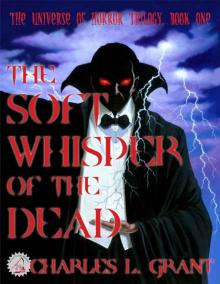 The Universe of Horror Volume 1: The Soft Whisper of the Dead (Neccon Classic Horror)
The Universe of Horror Volume 1: The Soft Whisper of the Dead (Neccon Classic Horror)![[Oxrun Station] Dialing The Wind Read online](http://i1.bookreadfree.com/i/03/19/oxrun_station_dialing_the_wind_preview.jpg) [Oxrun Station] Dialing The Wind
[Oxrun Station] Dialing The Wind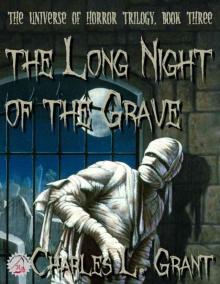 The Universe of Horror Volume 3: The Long Night of the Grave (Neccon Classic Horror)
The Universe of Horror Volume 3: The Long Night of the Grave (Neccon Classic Horror)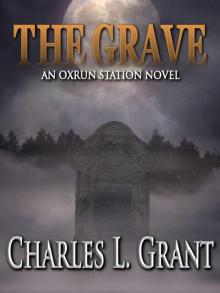 The Grave - An Oxrun Station Novel (Oxrun Station Novels)
The Grave - An Oxrun Station Novel (Oxrun Station Novels)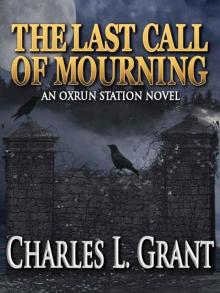 The Last Call of Mourning - An Oxrun Station Novel (Oxrun Station Novels)
The Last Call of Mourning - An Oxrun Station Novel (Oxrun Station Novels)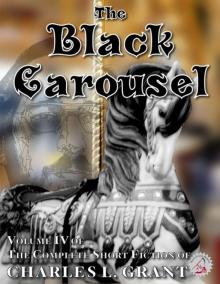 The Complete Short Fiction of Charles L. Grant, Volume IV: The Black Carousel
The Complete Short Fiction of Charles L. Grant, Volume IV: The Black Carousel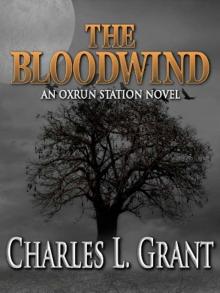 The Bloodwind - An Oxrun Station Novel (Oxrun Station Novels)
The Bloodwind - An Oxrun Station Novel (Oxrun Station Novels)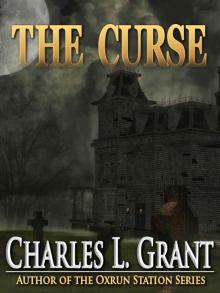 The Curse
The Curse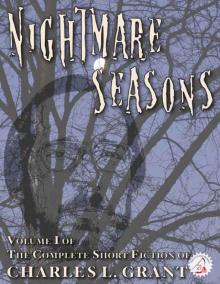 The Complete Short Fiction of Charles L. Grant Volume 1: Nightmare Seasons (Necon Classic Horror)
The Complete Short Fiction of Charles L. Grant Volume 1: Nightmare Seasons (Necon Classic Horror)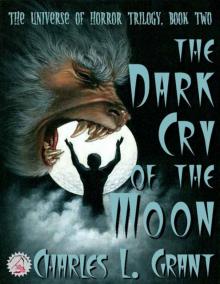 The Universe of Horror Volume 2: The Dark Cry of the Moon (Neccon Classic Horror)
The Universe of Horror Volume 2: The Dark Cry of the Moon (Neccon Classic Horror)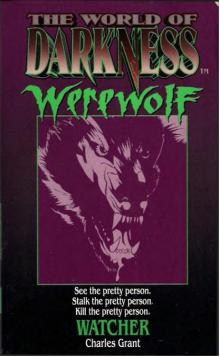 Watcher: Based on the Apocalypse (World of Darkness : Werewolf)
Watcher: Based on the Apocalypse (World of Darkness : Werewolf)![[Oxrun Station] The Bloodwind Read online](http://i1.bookreadfree.com/i/03/25/oxrun_station_the_bloodwind_preview.jpg) [Oxrun Station] The Bloodwind
[Oxrun Station] The Bloodwind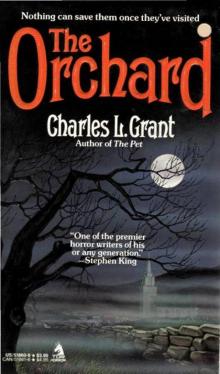 The Orchard
The Orchard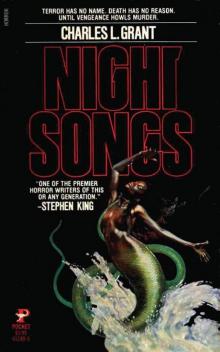 Night Songs
Night Songs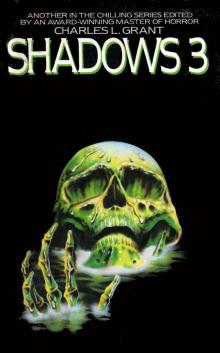 Shadows 3
Shadows 3![Symphony - [Millennium Quartet 01] Read online](http://i1.bookreadfree.com/i1/04/02/symphony_-_millennium_quartet_01_preview.jpg) Symphony - [Millennium Quartet 01]
Symphony - [Millennium Quartet 01] The Hour of the Oxrun Dead (Necon Classic Horror)
The Hour of the Oxrun Dead (Necon Classic Horror)![In the Mood - [Millennium Quartet 02] Read online](http://i1.bookreadfree.com/i1/03/31/in_the_mood_-_millennium_quartet_02_preview.jpg) In the Mood - [Millennium Quartet 02]
In the Mood - [Millennium Quartet 02]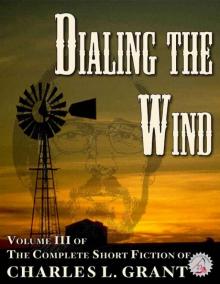 The Complete Short Fiction of Charles L. Grant Volume 3: Dialing the Wind (Neccon Classic Horror)
The Complete Short Fiction of Charles L. Grant Volume 3: Dialing the Wind (Neccon Classic Horror)![[Oxrun Station] The Last Call of Mourning Read online](http://i1.bookreadfree.com/i2/04/05/oxrun_station_the_last_call_of_mourning_preview.jpg) [Oxrun Station] The Last Call of Mourning
[Oxrun Station] The Last Call of Mourning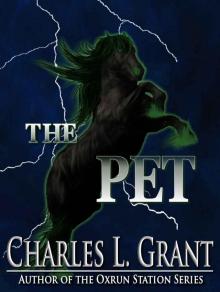 The Pet
The Pet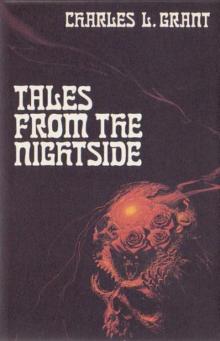 Tales from the Nightside
Tales from the Nightside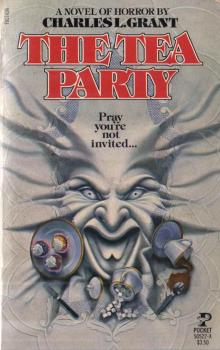 The Tea Party - A Novel of Horror
The Tea Party - A Novel of Horror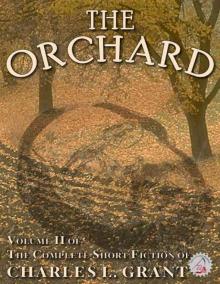 The Complete Short Fiction of Charles L. Grant Volume 2: The Orchard (Necon Classic Horror)
The Complete Short Fiction of Charles L. Grant Volume 2: The Orchard (Necon Classic Horror) Whirlwind
Whirlwind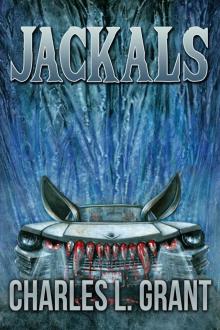 Jackals
Jackals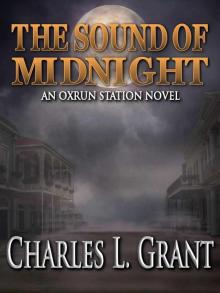 The Sound of Midnight - An Oxrun Station Novel
The Sound of Midnight - An Oxrun Station Novel